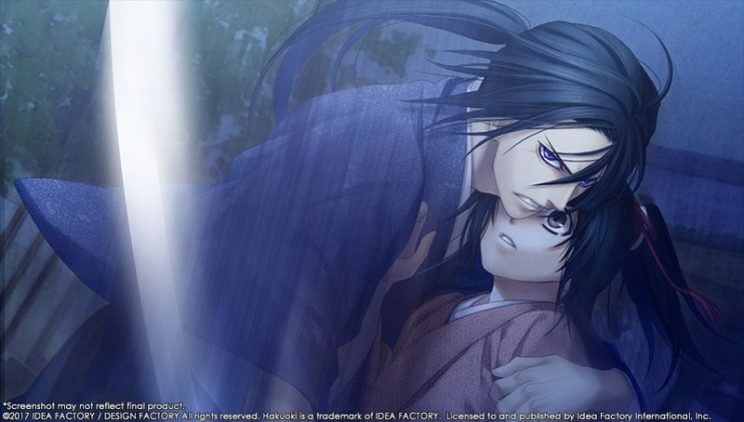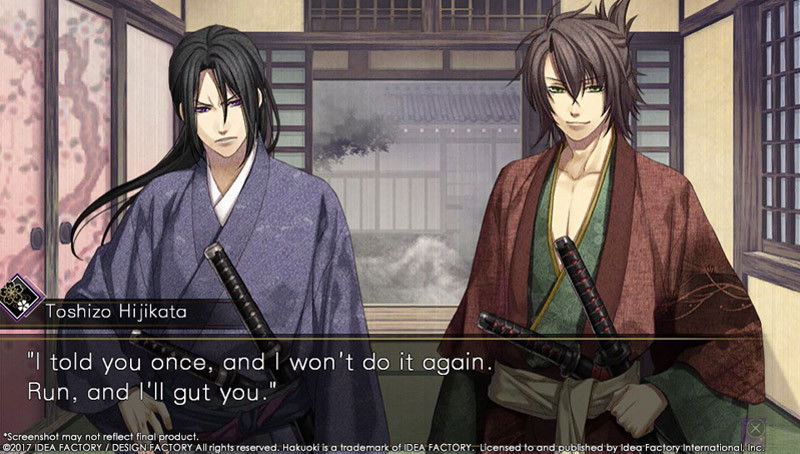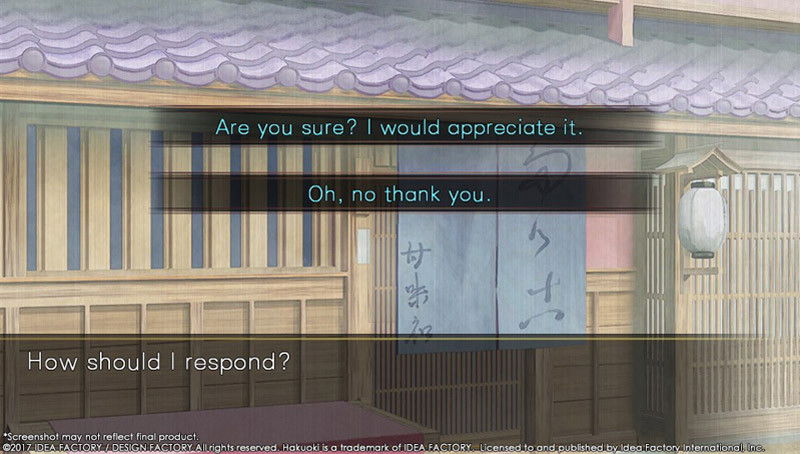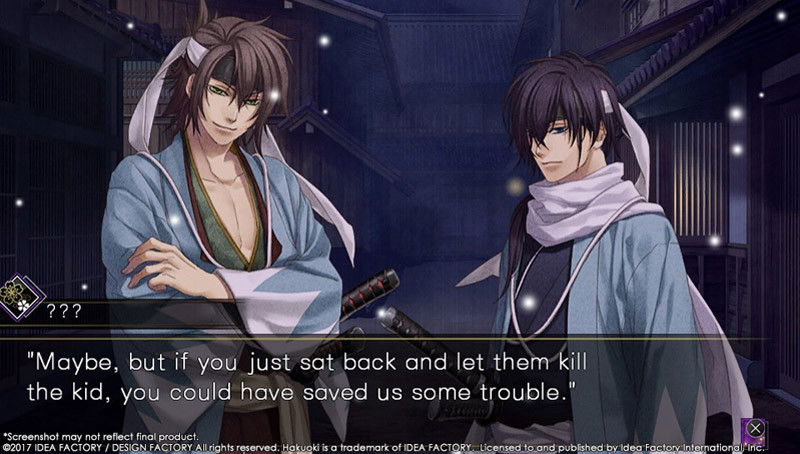Game Name: Hakuoki: Kyoto Winds
Platform(s): PS Vita
Publisher(s): Idea Factory/Design Factory
Developer(s): Idea Factory International
Release Date: May 16, 2017 (NA)
Price: $39.99
Hakuoki: Kyoto Winds follows a young woman in 1863 Japan who finds herself involved with the Shinsengumi, an elite samurai group. It is a remastered version of the 2008 title, arriving to North America for the first time on the PS Vita. The story relies heavily on your relationships with these samurai men, making the game a love story (sort of). Hakuoki is a substantial visual novel offering a fascinating glimpse at Japanese history.
Chizuru has not heard from her father in months. Her father, a doctor, traveled from Edo to Kyoto on work. Dressed in men’s clothing, Chizuru sets out to Kyoto to look for him. Along the way, she encounters trouble and is assisted by a few men from the Shinsengumi. After lots of persuading, the men agree to house Chizuru and help her find her father. When they find out she is a woman, romance ensues.
Hakuoki: Kyoto Winds starts off slowly. The first chapters consist of Chizuru trying to prove her worth and win over the samurai men. During this time, players are faced with a few choices to build Chizuru’s personality and shape her relationships. The decision-making is limited, and while I would have enjoyed more, player interaction isn’t too important to the game. The early chapters can feel a bit predictable, as you know that she will inevitably win these men over. However, that isn’t to say that Hakuoki isn’t surprising.
It does not strictly adhere to historical accuracy. Many of the figures are re-imagined versions of real people, and introducing some supernatural elements brings the right amount of fiction to the experience. Still, I’d be lying if I said the game wasn’t educational. Real historical figures and terms are highlighted in the dialogue and unlocked in an encyclopedia. The encyclopedia can be accessed in the game’s menu for reference. It makes Hakuoki: Kyoto Winds a fun way to learn about a specific era in Japanese history.
There are twelve eligible men to romance, but players are given five chapters to decide which character they want to pursue. Chizuru’s choice shapes the way the story plays out; about halfway through the story, one of twelve storylines begins. Each story is unique, so players may wish to replay Hakuoki with a different love interest. Accessing the warrior records in the game’s menu shows you relationship statuses – once records are opened, statuses read “budding” or “full bloom”.
The game is well-written, even if the romance aspect of can be a bit cheesy. Once you begin to unlock a romantic storyline, some of the writing feels a bit heavy-handed. Still, Hakuoki manages to avoid being too cutesy. It maintains a mature and oftentimes dark tone throughout the game, using comedic moments sparingly. It is lighthearted at the right times, and makes a very respectful piece of historical fiction.
Characters are likeable and distinct from one another, even during cheesy the romance phase. This is an important trait in a genre as narrative-focused as the visual novel. The story is well-paced enough for players to enjoy building relationships while reading about Japanese politics and battles. While the main characters have interesting arcs, Chizuru – the protagonist – suffers a bit from the choice-based story. Because players are intended to decide what kind of person she is, she feels a bit bland during the time between the decision-making. Games with branching storylines may avoid fully defining the protagonist’s personality, but the drawback is that a vague character can be an uniteresting one.
Some of Hakuoki‘s strongest features are its intricate environments and character designs. Hair, clothing, and scenes are impressively detailed and appear hand-drawn. Accompanying reading with visual set pieces and music makes for an immersive experience, and one that is welcome on the Vita.
Hakuoki: Kyoto Winds is an entertaining look at mid-nineteenth century Japan. It’s a bit slow to get started, but it can be rewarding once it does. It uses the visual novel to illustrate a specific piece of history and educate players along the way. The romance is secondary, but Hakuoki wouldn’t be the same without it.
*Hakuoki: Kyoto Winds was provided to us by Idea Factory International for review purposes. For more information on how we review video games and other media/technology, please go review our Review Guideline/Scoring Policy for more info.
Summary
For visual novel fans, or anyone who gets excited about Vita releases, Hakuoki: Kyoto Winds is worth checking out. It’s not perfect – the story is slow to start and the writing can be a bit cheesy at times. However, its visuals are beautiful, the story is fun, and the Japanese history lesson is a bonus.
-
Witty sentence here and the score. remember to use the star system!





